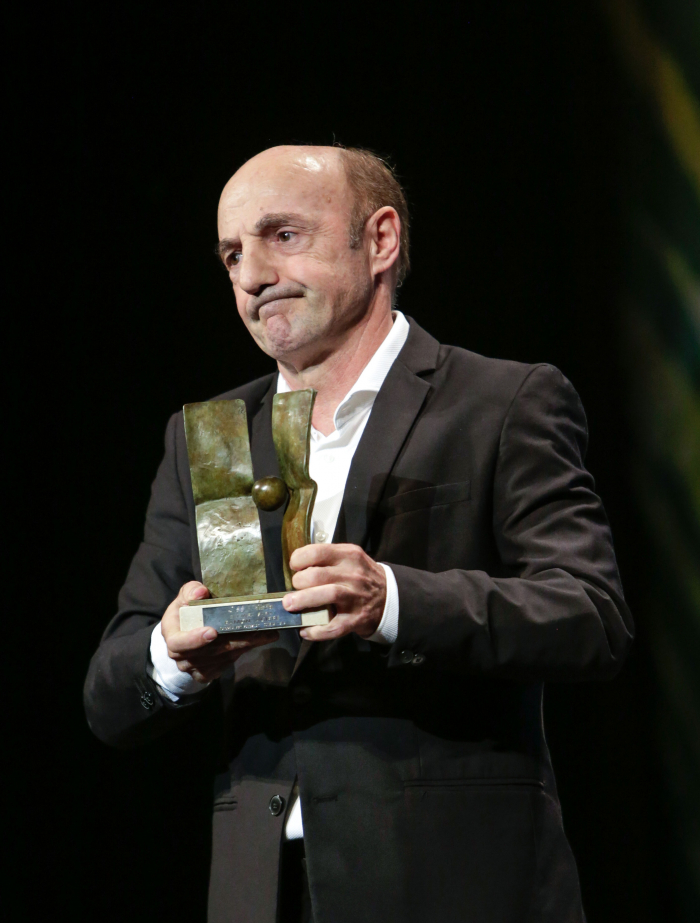Besides the premiere of the film Jainkoak ez dit barkatzen / God Doesn't Forgive Me, the Zinemira Award will also be presented at the Basque Film Gala, to take place on Tuesday September 25 at the Victoria Eugenia Theatre. The San Sebastian Festival and the producers associations IBAIA and EPE/AVE give this honorary award to the career of an outstanding figure in the world of Basque cinema, received in previous years by Imanol Uribe (2009), Álex Angulo (2010), Elías Querejeta (2011), Michel Gaztambide (2012), Juanba Berasategi (2013), Pedro Olea (2014), Karmele Soler (2015), Ramón Barea (2016) and Julia Juaniz (2017). In 2018 it will acknowledge the career of actor Ramón Agirre.
Having studied Architecture, Agirre (San Sebastián, 1954) became a member of one of the first generations of Antzerti, the school of dramatic art promoted by the Basque Government. Among his first film works are 27 horas (Montxo Armendariz, Silver Shell, 1986) and Ander eta Yul (Ana Díez, Zabaltegi-New Directors, 1988). He has worked under the orders of Álex de la Iglesia (El día de la bestia / The Day of the Beast, 1995), Manuel Gutiérrez Aragón (Visionarios / Visionaries, Official Selection, 2001), Pablo Malo (Frío sol de invierno / Cold Winter Sun, New Directors, Goya for Best New Director, 2004), Asier Altuna and Telmo Esnal (Aupa Etxebeste!, Youth Award, 2005), Emilio Martínez Lázaro (Las 13 rosas / 13 Roses, 2007, recipient of four Goyas and a further ten nominations), Aizpea Goenaga (Sukalde kontuak / Kitchen Secrets, Zinemira – Panorama 2009), Aitor Mazo and Patxo Telleria (La máquina de pintar nubes / The Cloud-Painting Machine, Zinemira 2009) and Alberto Gorritiberea (Arriya / The Stone, Zinemira-Panorama, 2011).
His recent years have been especially prolific with his work for Michael Haneke in Amour (2012), winner of the Golden Palm at Cannes, of the Academy Award for Best Foreign language Film and of the Fipresci Grand Prix in San Sebastian; Fernando Franco (La herida / The Wound, winner of the Special Jury Prize and Silver Shell for Best Actress, 2013); Mikel Rueda (A escondidas / Hidden Away, 2014); Fernando González Molina (Palmeras en la nieve / Palm Trees in the Snow, 2015); Pedro Almodóvar (Julieta, official section at Cannes and Made in Spain, 2016); Fernando Trueba (La reina de España / The Queen of Spain, 2016); or Aitor Arregi and Jon Garaño (Handia / Giant, Special Jury Prize, Irizar Basque Film Award and ten Goyas, 2017), among many others.
This year he appears in a film screening in the New Directors section, Oreina (The Deer, Koldo Almandoz, 2018), and in three films selected for Zinemira: Black is Beltza (Fermin Muguruza, 2018), Errementari (Paul Urkijo, 2017, Audience Award at the San Sebastian Horror Film Festival), and Bajo la piel del lobo (Samu Fuentes, 2017). In 2019 he will appear in Daniel Calparsoro's El silencio de la ciudad blanca, and Agur Etxebeste!, the sequel directed by Asier Altuna and Telmo Esnal.
Agirre has also worked in myriad short films, such as Adiós Toby, adiós (Ramón Barea, 1995), Tercero B (Jose Mari Goenaga, Kimuak 2002) or Deus et machina (Koldo Almandoz, Kimuak 2012) as well as having lent his voice to pieces such as Zeinek gehiago iraun (Gregorio Muro, Kimuak 2011).
At the Festival he sat on the jury of the Serbitzu-Zinemira Award in 2011, which gave its accolade to Bi anai (Two Brothers, Imanol Rayo).
Besides countless plays, Agirre has had parts in the most popular Basque TV series, such as Bertan Zoro, Bi eta bat, Goenkale, Martin, and, more recently, Go!azen, as well as in Spanish series including El joven Picasso, Los ladrones van a la oficina, Canguros, Hermanos de leche, La casa de los líos, Petra Delicado, El comisario, Médico de familia, Periodistas, Hospital central, Aquí no hay quien viva or La familia mata.
He also illustrated the book of poems Eta zergatik ez?... Sigrid, published by Susa in 1983, and won the Kutxa Ciudad de San Sebastián Literary Prize for the theatrical text of Errenta in 1994.





